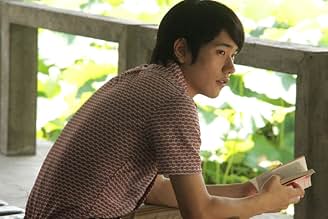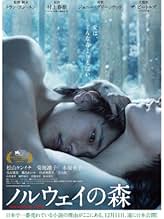Toru erinnert sich an sein Leben in den 1960ern, als sein Freund Kizuki sich selbst tötete und er dessen Freundin Naoko und einer anderen Frau, der extrovertierten, lebhaften Midori, nahekam... Alles lesenToru erinnert sich an sein Leben in den 1960ern, als sein Freund Kizuki sich selbst tötete und er dessen Freundin Naoko und einer anderen Frau, der extrovertierten, lebhaften Midori, nahekam.Toru erinnert sich an sein Leben in den 1960ern, als sein Freund Kizuki sich selbst tötete und er dessen Freundin Naoko und einer anderen Frau, der extrovertierten, lebhaften Midori, nahekam.
- Regie
- Drehbuch
- Hauptbesetzung
- Auszeichnungen
- 4 Gewinne & 9 Nominierungen insgesamt
- Student Activist
- (as Kohei Yoshino)
- Midori's Sister
- (Synchronisation)
Empfohlene Bewertungen
Scored by Jonny Greenwood with some narration by Watanabe, the film takes place in Tokyo in 1967 in the midst of student protests against the War in Vietnam. Trying to ease the pain of the shattering loss of Kizuki (Kengo Kora), a close friend from high school, Watanabe immerses himself in his studies at school where he is majoring in drama and, with Nagasawa (Tetsuji Tamayama), an older and more experienced friend, is able to release his tension by going to bars and picking up girls for sex. Things change, however, when Kizuki's former girlfriend, the beautiful but emotionally fragile Naoko (Rinko Kikuchi), shows up in Tokyo and reaches out to Watanabe for consolation. Though their language is exceedingly frank and sexually explicit, it is vital to understanding the characters and never used to titillate.
Their deepening relationship, however, only brings the feelings of loss closer to the surface and Naoko's ensuing emotional breakdown causes her to leave Tokyo for psychological rehabilitation at a mountain retreat where she is only able to see Watanabe intermittently. Even on occasional meetings, however, they embrace a dark ecstasy that inures them, at least temporarily, from their mutual grief, but when Naoko's roommate, music teacher Reiko (Reika Kirishima), sings the Lennon and McCartney song "Norwegian Wood" at Naoko's 20th birthday party, the line "and when I awoke, I was alone, this bird had flown," evokes tears that flow naturally.
Paralyzed by her sadness and feelings of responsibility for Kizuki's death, Naoko sinks deeper into despair and Watanabe's vows of lifelong fidelity are compromised by his attraction to Midori (Kiko Mizuhara), a smart, outgoing student who also has had to overcome a troubled past. Norwegian Wood is not a film about "teenage angst," or any other of the favorite catch phrases that substitute for empathy, but about the essence of life itself and the anguish of having to let go of attachments. More of a tone poem than a free-flowing narrative, the film creates an indelible experience of both exquisite beauty and aching pain, perhaps two sides of the same coin. Like the under-appreciated Tony Takitani, another film based on a story by Murakami, Norwegian Wood unfolds like a dream, evoking a mood of serenity and contemplation.
Supported by the stunning cinematography of Ping Bin Lee, much of the film's power takes place in the silences that allow us to simply observe the sublime beauty of the countryside, its forests, waterfalls, and the purity of its winter landscapes. While some may try, the film's emotional roller coaster cannot be filtered out and, in the process of assimilating it, it builds a quiet power that ensnares us and leaves us to explore its meanings long after the final credits. In spite of those who want to attach the label of "boring" to every film that moves slowly and requires concentration, Norwegian Wood will be remembered as one of Hung's best films and a work that brought cinema to a new level of artistic achievement.
The film is good - very good. Just not the great film I'd hoped it would be. There are wonderful scenes and great acting, and the cinematography is beautiful. But I think there are some major flaws. The flow of the film is oddly disjointed at times - while the book is very much written from the perspective of an older, wiser man looking back at his immature youth, the film seems unsure of its own perspective. The voice-over is poorly structured, seemingly aimed at filling in narrative gaps rather than giving us the older narrators overview. Oddly for Tran, a director who has been extremely minimalist in the past, some scenes are far too overwrought, not helped by the intrusive and anachronistic score. The casting is also uneven - Rinko Kikuchi is a marvelous actress, but is simply too old to play a convincing 20 year old. The character of Reiko is also played by an actress much younger than the character in the book, but the part hasn't been changed accordingly. That said, Kenichi Matsuyama as Toru and in particular Kiko Mizuhara as Midori are terrific.
I really don't know how someone who doesn't know the book will react to this. I suspect that if you are a romantic at heart, you will like it, even if you find it a bit overlong and some of the characters too thinly drawn. Fans of the book will mostly love it as it is quite faithful (maybe too faithful) to the story.
So putting aside the various one night stands he benefited from hanging out with casanova Nagasawa (Tetsuji Tamayama), Watanabe has to choose between Naoko (Kikuchi), a girl whom he knows from his younger days when she was the girlfriend of his best friend Kizuki (Kengo Kora) who inexplicably committed suicide, and that of Midori (Kiko Mizuhara putting in a very charismatic performance) who actually had made the first move in getting to know him better, although stopping short of going the full distance given a boyfriend whom we never see on screen.
Depending on your preference and emotional pull toward broad stereotypes of people, the two girls are very much distinct in their personalities, one being an emotional wreck given the loss of Kizuki and spending her time in rehabilitation, which accounted for the many lush, green and white sceneries depending on the calendar month, while the other is a perpetual sunshine, confident, outgoing and attractively lively. It's pessimism versus optimism, although you'd probably understand Watanabe's obligation toward Naoko having spent time growing up together, losing their mutual friend and growing close, not to mention an awkward deflowering process that happened to seal the emotional deal and attachment.
And you wonder if you'd call that love, or attraction even, as opposed to the proposition with another girl who had entered into a crossroads in his life, being stuck in time having to want to care for someone close, versus a new opportunity being presented with Midori's presence. Tran's vision puts one into a deliberately slow paced evaluation as Watanabe struggles to understand his emotional predicament and dilemma presented, where if one doesn't know how to proceed at a forked road ahead, one stalls for time, and stalling is what this film felt like.
But thanks to cinematographer Mark Lee Ping Bin, this allows for plenty of beautiful postcard picturesque shots of the countryside, and many visually stunning captures of emotions of the characters at hand, allowing sensitive, moving moments to come through, and even chances to showcase a long tracking shot set out in the fields which flip flops across the screen as Naoko shares with Watanabe her oft confused state. My favourite however involved that between Watanabe and Midori in a snow filled landscape, cold in scenery but completely filled with the warmth of heart. The cinematography added a boost in the mundane state of characterization, and when things can't move forward, at least your eyes can start to roam at the well crafted technical shots and composition of the film, in addition to the era of the 60s.
The subplots of the rich story tried to muscle its way into the film but ultimately got sacrificed to stay focus on the primary trio, in a tale about finding it tough to let go and move on without being perceived as uncaring. And just when I thought the story had finally found its grounding from which to move off, in comes a deus ex machina moment to help propel it forward, taking off the shine of emotional roller-coaster of the previous two hours, which made it all seem a little futile and a waste. Draw your own conclusions if you will since the film left things unsatisfying open ended, and what you take away from the film, will probably be self reflective. I tried to love this film, but ultimately I can't.
Neo rates it 9/10.
- www.thehkneo.com
Wusstest du schon
- WissenswertesThis is only Jonny Greenwood's second film score, following his acclaimed work on There Will Be Blood (2007). Greenwood was keen to score the film as he was a big fan of the novel. His involvement was in some doubt, however, as Thom Yorke wanted to return to the studios to record a new Radiohead album. Greenwood found the time to balance both projects.
- Zitate
Toru Watanabe: Nothing can heal the loss of a beloved. No truth, no sincerity, no strength, no kindness can heal that sorrow. All we can do is live through the sorrow and learn something from it. But whatever we learn will be of no help in facing the next sorrow that comes along.
- Alternative VersionenThe German TV version is 10 min shorter.
- VerbindungenFeatured in At the Movies: Venice Film Festival 2010 (2010)
Top-Auswahl
Details
- Erscheinungsdatum
- Herkunftsland
- Offizielle Standorte
- Sprache
- Auch bekannt als
- Norwegian Wood
- Drehorte
- Produktionsfirmen
- Weitere beteiligte Unternehmen bei IMDbPro anzeigen
Box Office
- Bruttoertrag in den USA und Kanada
- 13.000 $
- Eröffnungswochenende in den USA und in Kanada
- 13.000 $
- 8. Jan. 2012
- Weltweiter Bruttoertrag
- 19.144.719 $
- Laufzeit2 Stunden 13 Minuten
- Farbe
- Sound-Mix
- Seitenverhältnis
- 2.35 : 1
Zu dieser Seite beitragen

















